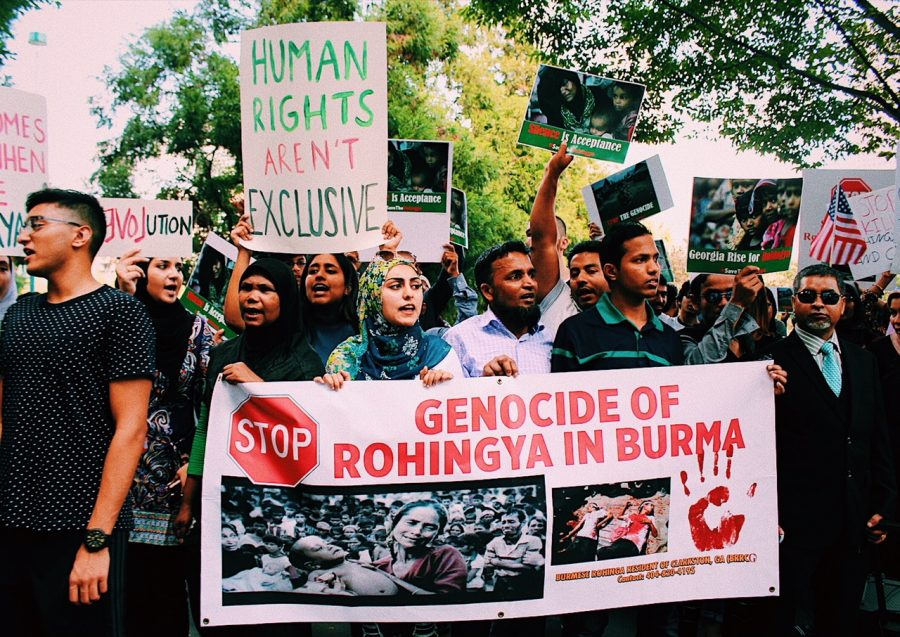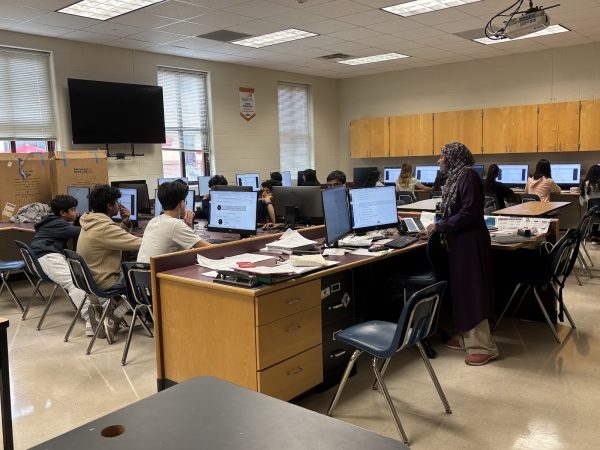Genocide in Myanmar Continues
As the genocide in Myanmar continues, it has steadily fallen out of the spotlight of media coverage. Since August, over half a million people have fled from the genocide in the Rakhine state of Myanmar to neighboring Bangladesh. The estimated number of deaths varies between 6,700 to even 9,000. UNICEF officials have estimated that half of all the refugees they are receiving are children, many of them now orphans.
The fighting was sparked after a group of terrorists in Rakhtyine killed Myanmar police officers and the Myanmar military responded with indiscriminate killing of innocent villagers throughout the state. Myanmar denies ethnic cleansing and continues to uphold a narrative of fighting terrorist cells, despite videos and photos surfacing on the internet displaying entire villages on fire and injured refugees arriving into Bangladesh with stories of indiscriminate killings and destruction of communities. Some of the most gruesome accounts detail stories of the Myanmar military forcing entire families into their homes and setting the house on fire along with other human rights violations of rape and infanticide. The military of Myanmar is also suspected of planting landmines on the border, so that if refugees flee into Bangladesh, they would die.
Furthermore, the Rohingya people are not recognized as citizens in Myanmar, and most if not all of those fleeing the violence have no identification papers, allowing Myanmar to make the claim that those who have fled Rakhine, will not be allowed to return. This has sparked protests from the Bangladesh government which insisted that at Myanmar must accept returning Rohingya people.
Tensions between the Rohingya minority and the Buddhist majority populations have been partially contributed to the time of British colonization, during which the British favored the Muslims over the Buddhists. Then during World War II, Rohingya Muslims supported the British forces who already occupied the country as a colony; while the Buddhist population mostly supported the Japanese forces in hopes the Japanese would free them from British rule. Myanmar (then known as Burma) was freed from colonization in 1947, a new constitution was written that allowed the Rohingya rights. However after a 1962 military takeover the Rohingya were unable to prove citizenship and have since been seen as a stateless people. These historical disputes have impacted the relations between the two groups since. Recent clashes between the Rohingya and military were also recorded between 2012 and 2014.UN officials state that this conflict has been “decades in the making” and emphasize that for the past half century, the Buddhist majority has believed that the Rohingya don’t belong in Myanmar.
A BBC investigation has uncovered that the United Nations failed to address the conditions of oppression the Rohingya experienced in fear of angering the Burmese government. Several former workers have come forward claiming reports on the Rohingya status were spiked.
Aung San Suu Kyi, the leader of Myanmar, has received global condemnation for her silence and continued indifference to the military actions. In early November, she visited a villiage in Rakine, but did not condemn the military nor offer support for the Rohyinga people. Later in November, she denied the genocide and claimed the Myanmar government “did not know” why thousands of Rohingya had fled.
In late September Bangladesh began to allow more NGOs and aid organizations to help refugees and camps, before the country only four organizations in. The Bangladesh government has also asked the World Bank for a $250 million loan to help in the refugee crisis.
Since August there has been global dismay from people and governments around the world at the actions of the Myanmar military. In September the United States Ambassador to the United Nations, Nikki Haley has called for the prosecution of Myanmar officials.
The United Nations has officially condemned the government of Myanmar and Aung San Suu Kyi with Zeid Ra’ad al-Hussein, the UN high commissioner on human rights, calling it “a textbook example of genocide”
The Organization of Islamic Cooperation – an international coalition of Muslim majority countries or countries whose official religion is Islam – voiced its support for the Rohingya and condemned the actions of the Myanmar government. Echoing these sentiments, the Dalai Lama along with Malala Yousafzai have condemned Aung San Suu Kyi for her silence and continued denial of the mistreatment of the Rohingya people. A week ago Pope Francis visited Myanmar and Bangladesh and met with 16 Rohingya Muslims on December 1st and apologized to them for “the indifference of the world.”
In early September protests held in Pakistan, Bangladesh, Indonesia, Malaysia and the Philippines condemned the mistreatment of the Rohingya people and criticized Aung San Suu Kyi. Several United Nations sub organizations working in coordination with the European Union and the Kuwait government raised $344 million dollars in donations at an event held in October.
In September, Lambert senior Noora Chandasir attended a protest organized by Council on American-Islamic Relations (CAIR-GA) in Atlanta which condemned the genocide of the Rohingya minority in Myanmar. An estimated 500 people were in attendance marching around the city or protesting outside the CNN center.

Protesters in opposition to the genocide in Myanmar stand on the sidewalk in Atlanta.
Ms. Chandasir spoke of the protests as “charged, emotional, fiery, and utterly candid,”
“The majority of those who were there were Burmese Americans but most of them were Burmese refugees- those that actually fled the conflict years or months before the genocide escalated to what it is now. While I cried for justice for the Rohingya (the Burmese who are being killed) they cried for the loss of loved ones and those they had left behind.”

Protesters against the genocide in Myanmar hold signs.
Chandisar continued on saying, “It is shocking to me that after numerous history lessons taught by those who condemn the Holocaust and the Rwandan genocide, are the same people who are ignorant of a genocide happening in our world at this moment. We label ourselves a progressive society, yet when change or advocacy is needed we halt and ignore the problems.”
The protests were also aimed to convince Georgia Senators David Perdue and Johnny Isakson to support John McCain’s senate Resolution 250. The resolution formally condemns the activities of the Myanmar government and calls upon Aung San Suu Kyi to act to help the Rohingya people. It also calls for Myanmar to allow neutral UN observers into the country to examine the situation. However, it was only introduced the Senate in September and since then it has not been voted on.
Since August the genocide in Myanmar has sent thousands across the border into Bangladesh. Thousands of people still await proper identification cards from the United Nations while living in cramped and unclean living conditions.
Your donation will help support The Lambert Post, Lambert High Schools student-run newspaper! Your contribution will allow us to purchase equipment and cover website hosting costs.








